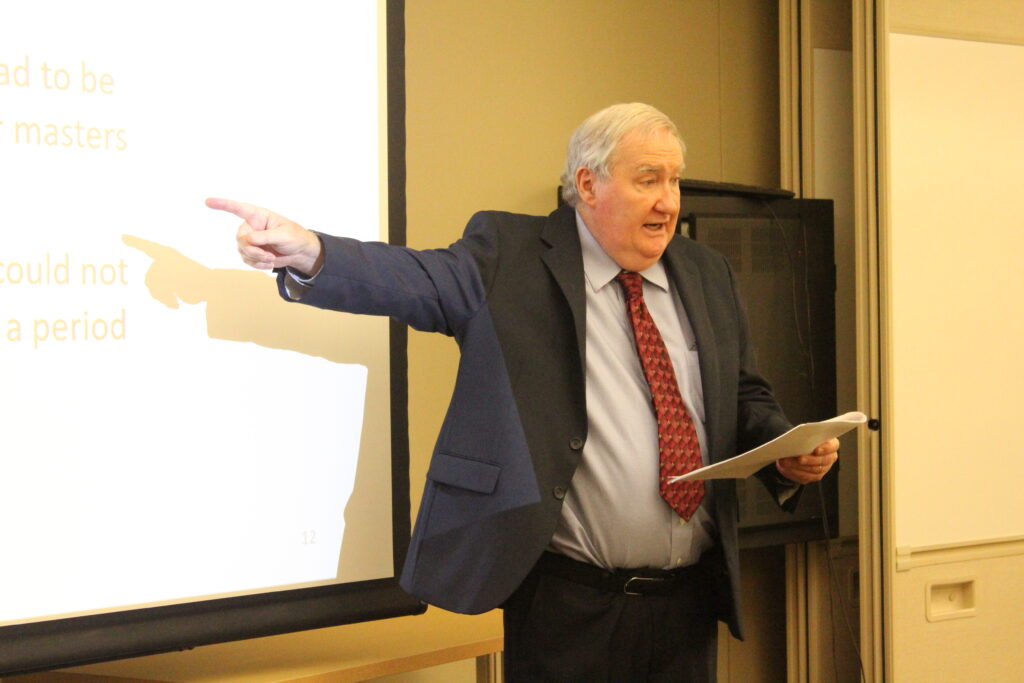MICHAEL WILLIAMS
Staff Writer

CHANDLER COTTER | Special to The Leader
While most Americans recognize the importance of the U.S. Constitution, many do not realize the significance of Constitution Day.
The American Democracy Project (ADP) held an event to commemorate this observance. On Wednesday, Sept. 13, Professor Wilson Huhn, from the Kline School of Law at Duquesne University, was welcomed by ADP to give a speech on the U.S. Constitution on Constitution Day.
Huhn received his bachelor’s degree at Yale University and got his Juris Doctor from Cornell. He wrote for the Cornell University Law Review upon his graduation. Huhn says he was pleased to be on Fredonia’s campus, as he grew up in Chautauqua County.
Huhn began his presentation with the origins of the Constitution. The first Chief Justice of the Supreme Court, John Marshall, supported an expansive view of the Constitution and thought that the federal government had a broad right to do what it needed infringing on enumerated rights. As Marshall states, “It is a Constitution we are expounding upon.”
Huhn also covered the decision of Dred Scott v. Sandford, which ruled that Black people were not equal to white folk, and they cannot be granted due process under the law. Huhn states, “There was no room for equality because the founders decided to embrace slavery.”
After the Civil War, the 13th, 14th and 15th Amendments were passed. The purpose of these amendments was to lay the groundwork for a more equal and just union.
However, most justices on the Supreme Court were appointed by Southern Democrats after the Lincoln Administration. This led to rulings like Williams v. Mississippi, which allowed for the grandfather clause and poll taxes for Black people to stay constitutional. It also allowed for rulings like Plessy v. Ferguson, which let Black citizens be discriminated against legally in public places.
While most people focus on the Lochner era in the Supreme Court as a time of economic regulation, it was used to define the laws on race and justice in America.
Then, in 1968, Griswold v. Connecticut was decided. This ruling gave American citizens the general right to freedom in personal choices in health and life, and set up the precedent for Roe v. Wade.
In Roe, the Court recognized a woman’s right to choose what to do with her own body. The Court believed that this was the just choice for women facing unintended childbirth.
Huhn stated, “Abortion is far safer than childbirth, particularly in the United States, which has the highest maternal mortality rate in the entire world.”
In 1986, in the case Bowers v. Hardwick, the Supreme Court ruled that sodomy was illegal under the Constitution. This ruling lasted until 2003, when the case Lawrence v. Texas was decided. This is significant because the Court was composed of a different majority ideology at this time.
They also now legalized gay marriage in 2015 through the landmark case Obergefell v. Hodges. In the majority opinion, Kennedy used the 13th Amendment to grant gay citizens the same right to choose to marry as straight ones under the equal protection clause.
However, the Supreme Court overturned Roe and Planned Parenthood v. Casey in the new ruling Jackson v. Dobbs, which no longer recognized the constitutional right to choose. Justice Samuel Alito based his majority decision on traditional history, different from the liberal arguments of justice and equality.
ADP student representative and News Editor of The Leader Dan Quagliana said after the presentation that it “felt relaxed enough so that it didn’t feel like a lecture. I think it was great how Huhn went over established precedent, and then discussed the current climate of Jackson v. Dobbs and how it’s different than cases have been in the past. It allowed me to better understand the gravity of the situation.”
After the presentation, many viewers asked questions about the current Supreme Court and its trajectory away from liberal democracy. Huhn stated, “I think the golden rule applies here somewhere. This Supreme Court has thrown out the principle of stare decisis, and the Trump Court’s decisions will not be dealt with lightly.”
Dan Quagliana, one of the interviewees for this article, is currently the News Editor of The Leader and also a student representative for the American Democracy Project (ADP).
